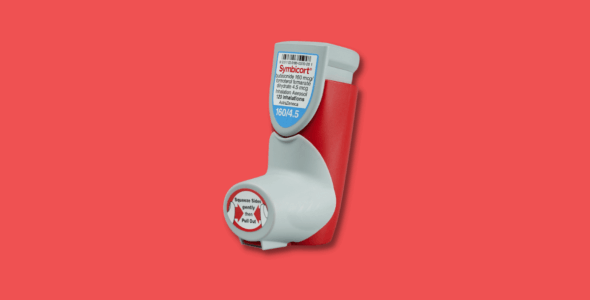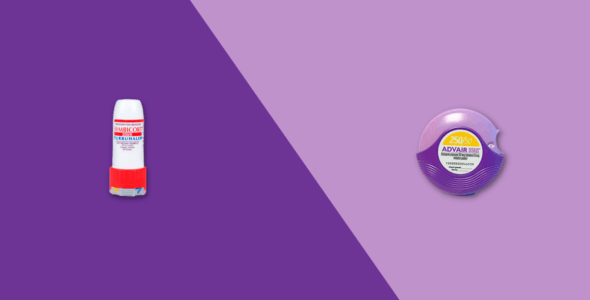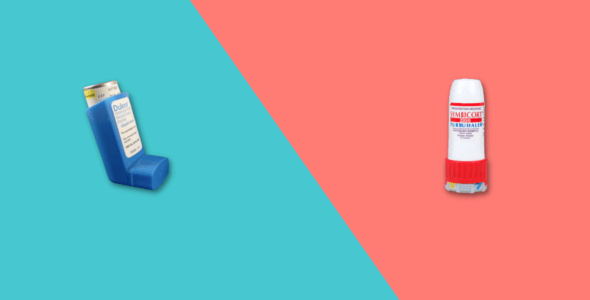Symbicort side effects and how to avoid them
Table of contents
Symbicort is a brand-name medication manufactured by AstraZeneca. It is used for the treatment of chronic obstructive pulmonary disease. While Symbicort is generally well tolerated, there are some potential side effects that people should be aware of. The most common side effects of Symbicort include sore throats. Less common, but more serious side effects, can include serious allergic reactions.
Learn more about the side effects of Symbicort and what you can do to avoid them.
What is Symbicort (budesonide/formoterol)?
Symbicort (budesonide/formoterol) is an FDA-approved medication manufactured by AstraZeneca used to treat asthma in adults and children aged 12 and over. It is also used to improve symptoms of chronic obstructive pulmonary disease (COPD), including chronic bronchitis and emphysema in adults.
Asthma is an inflammatory disease of the lungs and airways; it can cause your chest to tighten and make it difficult to breathe. COPD is a condition that also affects the lungs and makes it hard to breathe. Symbicort assists with both of these conditions by reducing inflammation and by relaxing the muscles in the lungs and airways. This helps to reduce the feeling of tightness in your chest and makes it easier for you to breathe.
Symbicort contains two active ingredients: budesonide and formoterol fumarate dihydrate. Formoterol fumarate dihydrate is a long-acting beta-agonist (LABA), and a bronchodilator, and relaxes the muscles in your airways, making it easier to breathe. Budesonide is an inhaled corticosteroid (ICS) that reduces inflammation in the lungs. When both are used in combination, they reduce the incidence of asthma symptoms and can help manage the symptoms of chronic obstructive pulmonary disease.
RELATED: What is Symbicort
Symbicort dosage
Symbicort is available as a metered-dose inhaler in the following doses: 80 mcg/4.5 mcg per actuation, 160 mcg/4.5 mcg per actuation.
Symbicort comes as a dry powder that is inhaled using an inhaler device called a Turbohaler. You usually take the medicine once a day to prevent symptoms from occurring. It can be taken as a preventative measure before an activity that causes you breathing problems.
Symbicort is not a rescue treatment for asthma attacks or bronchospasm. Use only fast-acting inhalation medicine for an asthma attack. Seek medical attention if your breathing problems get worse, or if you think your medications are not working.
Rinse your mouth with water after each use of your Symbicort inhaler. This will reduce the chances of developing sore throats or oral thrush. If you miss a dose, skip the missed dose and take your next dose at the normally scheduled time. Do not double your doses.
Store your Symbicort Turbuhaler at room temperature in an upright position, with the mouthpiece down. Keep away from heat or an open flame. Discard the canister once the counter reads 0 (zero), or if you have been using this particular Turbohaler for longer than 3 months.
Read the medication guide provided with this medicine for the full drug information, and always speak with your healthcare provider for medical advice about any changes to your dose so they can monitor and evaluate your condition.
RELATED: Symbicort dosage
Symbicort side effects
The most common side effects of Symbicort in clinical trials include:
- Mild sore throat and coughing
- Throat irritation
- Thrush (fungal infections)
- Nasal congestion
- Inflammation of the sinuses (sinusitis)
- Upper respiratory tract infections
- Back pain
- Headaches
- Stomach discomfort
- Trembling and shaking
- Pneumonia
More serious side effects of Symbicort include:
- Disturbed sleep
- Dizziness
- Nausea
- Unusual tiredness or weakness
- Muscle cramps
- Blurred vision
- Immune system problem (eg, Churg-Strauss syndrome)
- Increased risk of bone loss (osteoporosis)
- High blood sugar (hyperglycemia) – symptoms include increased thirst or urination
- Decreases in blood potassium levels (hypokalemia)
- Worsening of breathing problems
- Serious side effects, including chest pain, fast/slow/irregular heartbeat, severe dizziness, fainting, seizures
- Serious allergic reactions such as hives, difficulty breathing, shortness of breath, swelling of your face, lips, tongue, or throat
If you experience any of these serious side effects, stop taking Symbicort and seek medical attention immediately. You are encouraged to report negative side effects of prescription drugs to the FDA. Visit www.fda.gov/medwatch, or call 1-800-FDA-1088.
Symbicort drug interactions
Symbicort can interact with other medications including:
- Other medications to treat asthma or other breathing problems
- Beta-blockers
- Medications for a fast or uneven heartbeat
- Medications to treat heart failure, like digoxin
- Diuretics
- Steroids taken orally
- Tricyclic antidepressants
- HIV-protease inhibitors
- Medications for thyroid problems
- Medications to treat Parkinson’s disease
Before taking Symbicort, be sure to tell your doctor about all of the medications you are taking to ensure they are safe to take at the same time.
Symbicort warnings & precautions
You should not use Symbicort if you:
- Are allergic to the active ingredients budesonide or formoterol fumarate dihydrate
- Have had an allergic reaction to any of the other ingredients found in Symbicort
- Are under 12 years of age (for treating asthma)
- Are under 18 years of age (for treating chronic obstructive pulmonary disease)
Talk to your doctor before using Symbicort if you:
- Are diabetic
- Have a lung infection
- Have severe liver problems
- Have high blood pressure
- Have or have had any heart problems, like narrowing of the arteries, an uneven heartbeat, or heart failure
- Have glaucoma, cataracts, or other vision problems
- Have been exposed to infections such as chicken pox or measles
- Have problems with your adrenal glands or thyroid
- Have low levels of potassium in your blood
- Have an intolerance to any sugars
- Are pregnant or are breastfeeding – budesonide passes into breast milk. It is not known if formoterol passes into breast milk
You should always check with your doctor or pharmacist before taking any medication, including Symbicort, to make sure it is safe for you.
How to avoid Symbicort side effects
The best way to avoid side effects is to take Symbicort as directed by your doctor. Follow your doctor’s instructions carefully and do not take more or less than prescribed.
If you experience any side effects, talk to your doctor or pharmacist. They may be able to recommend ways to help reduce or prevent some of the side effects.
1. Stick to the recommended dosage
Take your prescribed dose of Symbicort that has been recommended by your healthcare professional. Do not take more or less than prescribed.
2. Monitor your blood sugar levels
If you have diabetes, it is important to monitor your blood sugar levels closely while taking Symbicort. Check your blood sugar levels as directed by your doctor and report any changes to your doctor immediately.
3. Avoid alcohol
Moderate drinking is advised while taking Symbicort as its effectiveness may be decreased and side effects may be increased.
4. Don’t skip meals
Eating regular meals and snacks will help to prevent low blood sugar levels (hypoglycemia).
5. Check your feet
If you have diabetes, check your feet for any cuts, sores, or redness regularly. Tell your doctor if you experience any problems with your feet while taking Symbicort.
6. Know the signs and symptoms of Symbicort side effects
Signs and symptoms of side effects include sore throats, oral thrush, and upper respiratory infections. If you experience any of these symptoms speak to your doctor for medical advice.
7. Monitor your weight
Weight gain has not been reported when using Symbicort. However, corticosteroids can cause weight gain. If you experience changes in your weight while taking Symbicort, get medical advice from your doctor.
8. Tell your doctor about all medications you’re taking
Be sure to tell your doctor about all other medications you’re taking, including over-the-counter drugs, vitamins, and herbal supplements, as they can interact with Symbicort.
9. Get regular medical check ups
It is important to get regular medical check ups and monitor your medical conditions. Your doctor will monitor your side effects and may adjust your dose of Symbicort as needed.
Medically reviewed
A medical professional has reviewed this article.


Jamie Winn, PharmD
Jamie Winn, PharmD
Dr. Jamie Winn received his Doctor of Pharmacy in 2002 from the University of South Carolina College of Pharmacy, Columbia, SC. Jamie is a medical reviewer for NiceRx.







